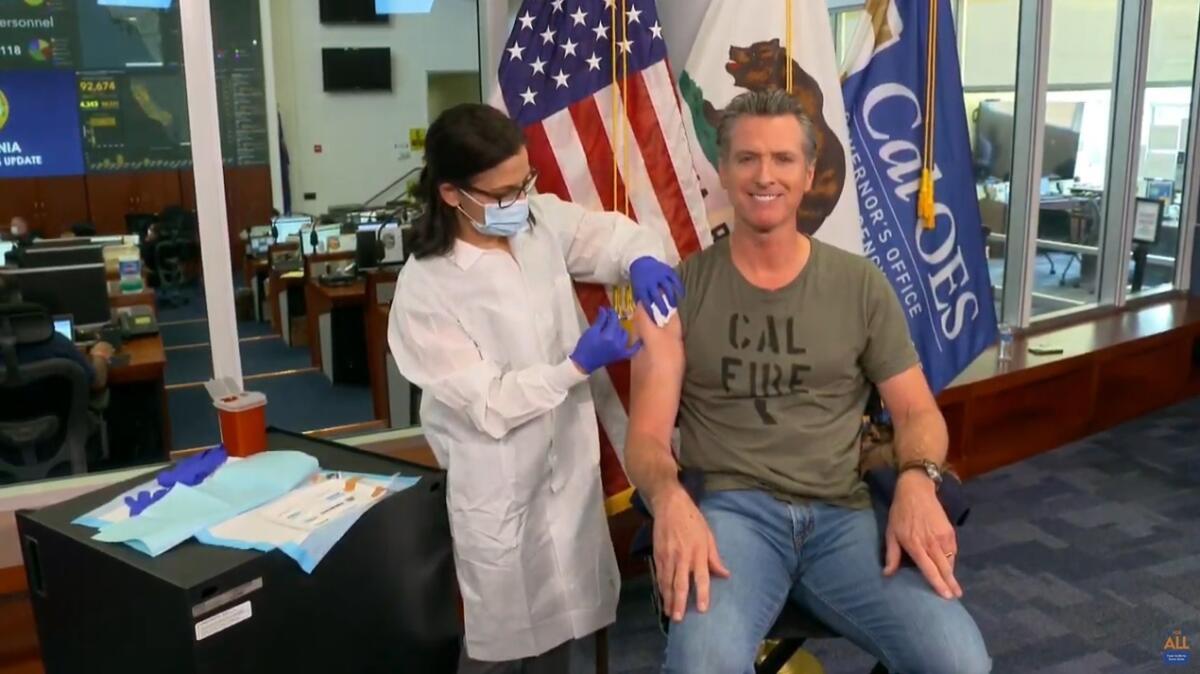Will the California recall of 2021 be wild or mild? Here’s your guide

- Share via
A California recall effort has collected enough signatures to trigger a historic 2021 election in which voters could remove Gov. Gavin Newsom from office .
It’s going to be a political spectacle. But it’s still not clear that it will match the wild ride of the 2003 recall that ushered Arnold Schwarzenegger into office. The current recall effort has some reality TV star power, but there are indications it won’t reach the drama of 2003, and Newsom appears to be better situated to prevent his ouster.
A recent Public Policy Institute of California poll of likely voters found most Californians — 56% — oppose recalling Newsom, while 40% support it. Conversely, a week before the 2003 recall, an L.A. Times poll found 56% of likely voters would vote yes on recalling Gov. Gray Davis, while 42% would vote no. Just 2% said they were undecided.
Still, it’s a humbling moment for Newsom, whose term in office has been dominated by responding to the pandemic as well as record wildfires and now a likely drought. His handling of the COVID-19 crisis — including his shutdown of the economy — emerged as a major issue fueling the recall effort. But Newsom’s governing style and liberal policies also are cited by recall proponents.
Here’s what to expect moving forward, from the pages of The Times:
Have all the signatures been validated?
In all, Newsom’s critics gathered 1,626,042 valid voter signatures on recall petitions, according to the report issued Monday by Secretary of State Shirley Weber, which contains information collected from elections officials in California’s 58 counties as of April 19. Some signatures remain unexamined. The final report could be issued by Friday.
Before the recall can be certified by Weber, voters who signed the petitions will have 30 business days to withdraw their signatures, and state officials will crunch the numbers on the cost to conduct the election, steps that could take up to three months to complete. Only then can Weber issue her official certification, triggering action by Lt. Gov. Eleni Kounalakis to call an election within 60 to 80 days.
Voters will decide whether Newsom is recalled and, if he is removed from office, who should replace him. Newsom is barred from being listed among the candidates who can be considered if the recall passes.
When will California vote?
There’s no certainty on when the recall election will be held.
The Newsom recall is the 11th effort to remove a California officeholder in state history, but only the second since extra steps were added by the California Legislature in 2017 that could delay the special election until late fall.
Though a group led by Democrats is urging voters to remove their signatures — alleging many of them may not have realized the consequences and cost of a recall election — the odds are low that enough Californians will change their minds to derail the effort.
It’s possible voters could decide the governor’s fate as soon as October. But it’s more likely that the election won’t happen until November.
How much will it cost?
Local officials from across California believe the cost of conducting the election could run as high as $400 million.
The estimate is four to five times higher than guesses bandied about in recent months and is equal to about $18 per registered voter, more than double what officials say was spent on California elections in 2018.
Counties already struggling to pay for pandemic-related services say they’ll need the state to cover any election costs.
Who is running?
Former San Diego Mayor Kevin Faulconer, a Republican, announced earlier this year that he would challenge Newsom, either in a recall campaign or when Newsom is up for reelection in 2022. Republicans John Cox, a businessman who was defeated by Newsom in the 2018 election, and former Northern California Rep. Doug Ose, who left office in 2005, are also in the running, as is reality television star and Olympic gold-medalist Caitlyn Jenner. Both are also Republicans.
Two familiar faces who were candidates in the 2003 recall election have also joined the race: former adult film actress Mary Carey and L.A. billboard icon Angelyne.
Others caught up in the swirl of rumors and speculation about potential candidates include Richard Grenell, who served as ambassador to Germany and acting director of national intelligence in the Trump administration.
How about a Democratic challenge?
No major Democrat has joined the race — yet.
Newsom’s party wants to present a united front, which could boost its argument that the recall is a GOP power grab, seeking to accomplish through a special election what they can’t through a regular campaign. That would also avoid a repeat of the 2003 recall, when Davis’ allies believed then-Lt. Gov. Cruz Bustamante’s decision to run as a backup in case the recall was successful cost the governor Democratic votes.
However, other strategists argue that it is imperative to have a prominent Democrat on the ballot on the chance Newsom is recalled. Names often mentioned include former Los Angeles Mayor Antonio Villaraigosa and billionaire hedge fund founder turned clean energy proponent Tom Steyer. A decision to run could make them Democratic pariahs if they are unsuccessful — or their party’s savior if Newsom is recalled.
What do the polls show?
Newsom’s job approval rating among California voters has suffered, according to two independent political polls released in February. The surveys found that roughly half of voters gave Newsom good marks, down from 64% earlier in the year.
In a Public Policy Institute of California poll released in March, 56% of voters said they opposed the recall, 40% supported it and the remainder were undecided. The percentage of those who favored ousting Newsom was slightly above the support for former President Trump in California in the November election, when he received 34% of the vote.
California has seen major improvements in the COVID-19 fight in recent months and is rapidly reopening the economy.
Some experts said continued progress could help Newsom overcome the recall push.
“Its fate today looks much less possible than it did when this recall drive began in earnest,” said UC San Diego political scientist Thad Kousser. “But if there’s anything we’ve learned last year it is that things could change dramatically in another four months.”
The spectacle of the 2003 recall election fascinated people across the country, who were intrigued by California’s reputation as a far-out haven for sun-baked dreamers, celebrities and Hollywood wannabes — and political absurdity. More than 130 candidates hoping to replace Davis crammed the ballot, among them Hustler magazine founder Larry Flynt, former Major League Baseball commissioner Peter Ueberroth, Huffington Post co-founder Arianna Huffington and “Diff’rent Strokes” star Gary Coleman.
Whether this recall will have the same appeal remains a question.
More to Read
Sign up for Essential California
The most important California stories and recommendations in your inbox every morning.
You may occasionally receive promotional content from the Los Angeles Times.

















